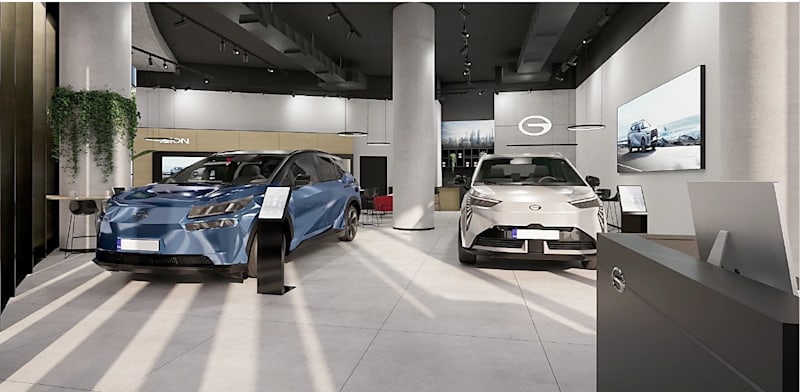In May Israeli Minister of Transport Miri Regev and her entourage visited the Tesla Model Y manufacturing plant in Germany, where she met with senior executives from the global company’s management. The details of the visit were kept secret by the Ministry of Transport at the request of their hosts from Tesla. However, it can now be revealed that during the visit, which included a meeting with Tesla VP EMEA Joe Ward, it was agreed that he would come to Israel to examine the possibility of establishing a Tesla hub for smart transport for Israel and the Middle East.
Tesla is in the midst of a global move to achieve global leadership in autonomous driving, which the company’s chairman, Elon Musk, has identified as a strategic goal for the company. As part of this, Tesla is running advanced tests of its fully autonomous driving system, known as FSD, in several locations in the US and China, both as robot taxis and as tests on public roads, using volunteer drivers in Tesla car they own.
Despite this, Tesla has not yet succeeded anywhere in the world in surmounting the regulatory hurdle that would allow it to begin unlimited use of the technology for its millions of customers. Although there are currently thousands of Tesla vehicles on Israeli roads, whose owners paid about NIS 36,000 for the smart system in their cars, in the hope that it will receive regulatory approval to operate it via a remote software update. But it is doubtful whether this was the reason Tesla insisted on including the software in these models, since the commercial potential in Israel is negligible compared with the volume of Tesla’s sales worldwide.
Israel’s advantages
It seems that the real importance of Israel for Tesla is its potential as a kind of ideal “testing ground” for the commercial operation of FSD systems in cars.
Israel has an advanced technological infrastructure in the field of autonomous driving, which allows monitoring the performance of such systems in the field and studying malfunctions under real conditions. This is a valuable asset for a project with global ambitions, and Mobileye, for example, has been doing this on public roads in Israel for several years, for the global market.
Another advantage is Israel’s relatively small size, which provides advantages for the navigation systems and terrain recognition of smart driving systems installed in vehicles. Also advantageous is the support of Israeli vehicle regulation for US and European standards, which allows testing the performance of smart systems in cars that meet all types of standards.
RELATED ARTICLES

New Chinese car brands fuel demand for showroom space
Mobileye soars after launch of Tesla’s Robotaxi
From a rooftop in India to running Tesla Israel
Can Tesla stage a comeback in Israel in 2025?
Finally, from the point of view of the automotive industry, Israel is a sophisticated but geographically isolated market. In other words, if vehicles equipped with such systems fail or have an accident, the global resonance of the event is limited, as is its impact on the shares of car manufacturers.
Easing regulation in Israel
Despite all this regulatory moves in Israel towards allowing autonomous systems in cars has lagged behind other countries. But last month, a breakthrough was recorded, when the Ministry of Transport allowed, for the first time, the legal use of autonomous parking systems in Israel when the driver is outside the car. Admittedly, this is only one and relatively marginal function of smart driving systems, and even this is subject to restrictions in Israel, such as the driver being within six meters of the vehicle. Still, this is an important step for many customers of models imported to Israel and its timing is probably related to Regev’s visit to Germany in May.
Almost every new car priced at NIS 160,000-300,000 or more that rolls off the production line in China today is equipped with software and hardware designed to support what the Chinese call “smart driving.” That is, a system that is capable of taking on a significant portion of the physical driving activity for extended periods of time and in complex situations. The trend will only grow, and Tesla is also currently placing such systems at the center of its strategic development for the coming years.
In the meantime, these systems are not yet intended to replace the driver, but mainly to assist in driving for long periods of time, including complex situations, without human intervention, but with the presence of a driver in the vehicle and their immediate readiness to take command if necessary.
Chinese teams in Israel
Many Chinese vehicle manufacturers are also currently using Israel as a kind of testing ground to try out the feasibility and upgrade of smart driving systems in vehicles.
According to estimates, there are currently tens of thousands of Chinese-made vehicles in Israel that support such systems, and whose capabilities can be upgraded through software updates. Many are going to need them in the coming quarters. This is a critical mass, which makes Israel an ideal development center for the Chinese.
For example, Huawei, which develops smart driving systems for many Chinese manufacturers, and even participates with some of them in the development of entire vehicles, has permanent technical teams in Israel, whose main role is to test the functioning of the systems in real-time conditions. Presumably the removal of regulatory barriers, which is currently underway in Israel, will boost this activity.
The Ministry of Transport confirms that the issue was discussed during the visit of the Minister of Transport and the Ministry’s director general to Tesla in Europe, during which driving demonstrations were also held of the company’s autonomous vehicles, which are not yet marketed to the public.
Published by Globes, Israel business news – en.globes.co.il – on August 11, 2025.
© Copyright of Globes Publisher Itonut (1983) Ltd., 2025.
en.globes.co.il (Article Sourced Website)
#Tesla #mulls #autonomous #driving #trials #Israel
